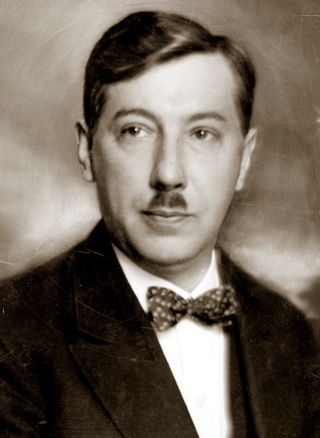
Eugeniusz Kwiatkowski was a Polish politician and economist, Deputy Prime Minister of Poland, government minister and manager of the Second Polish Republic.
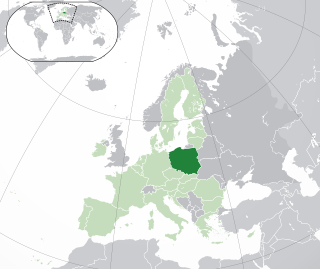
Lesbian, gay, bisexual, and transgender (LGBT) people in Poland face legal challenges not experienced by non-LGBT residents. According to ILGA-Europe's 2024 report, the status of LGBTQ rights in Poland is the worst among the European Union countries.

Wojciech Stefan Roszkowski OOB, sometimes known by the pseudonym Andrzej Albert, is an influential right-wing Polish historian and politician. From 1990 to 1993, he served as vice-rector of Warsaw School of Economics and from 1994 to 2000, he was the Kościuszko Chair of Polish Studies at the University of Virginia, USA. In 2004, Roszkowski won election to the European Parliament from the Law and Justice Party for a five year term.
Operation Hyacinth was a secret mass operation in Polish People’s Republic carried out by the Citizens' Militia in the years 1985-87. Its purpose was to create national database of all Polish homosexuals and people who were in touch with them, and it resulted in the registration of around 11,000 people.
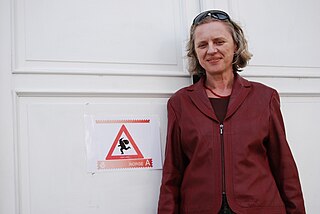
Izabela Filipiak is a Polish writer, an essayist, a columnist, and a scholar.
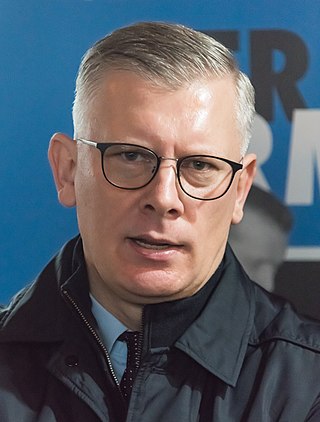
Sławomir Cenckiewicz is a Polish historian and journalist.
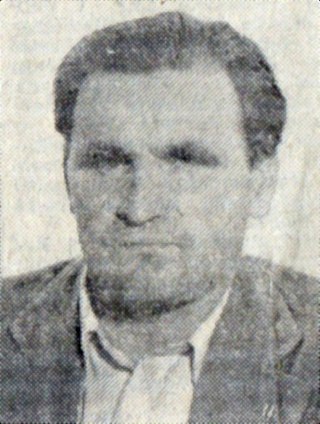
Albin Siwak was a Polish politician, construction worker and a social activist, who acted as a government sponsored antagonist of opposition leader Lech Wałęsa during the 1980s. Later in his career, Siwak held nationalist and anti-semitic views, arguing that Solidarity was a Jewish conspiracy.

Chałubińskiego 8 (Ch8), formerly known as Intraco II, and Oxford Tower, is a skyscraper office building in Warsaw, Poland, within the Downtown district, at 8 Chałubińskiego Street. It was opened in 1978, its height to the roof is 140 m, and its total architecural height is 150 m.

Jakobe Mansztajn is a Polish poet and blogger.
University of the Western Lands was an underground Polish university in occupied Poland during World War II. The faculty was composed mostly of the professors of Adam Mickiewicz University of Poznań who had been expelled by the Nazis, and included 17 different units, among them the faculty of medicine and surgery. It operated primarily in Warsaw from 1940 to 1944 and had branches in Kielce, Jędrzejów, Częstochowa and Milanówek.
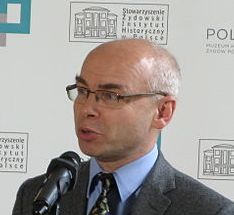
Dariusz Stola is a professor of history at the Institute of Political Studies of the Polish Academy of Sciences.

Waldemar Zboralski is a Polish veteran gay rights activist, politician, and journalist.
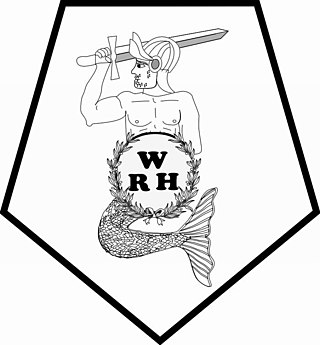
The Warsaw Homosexual Movement was an independent group of gays and lesbians which existed in Warsaw between January 1987 and summer 1988. The government of the Polish People's Republic refused the group's registration to become an NGO.

Homosexuality has been legal in Poland since 1932, though LGBT rights in Poland are among the most restricted in Europe. Homosexuality has been a taboo subject for most of Poland's history; combined with a lack of legal discrimination, this has often led to a lack of historical sources on the subject. Homophobia has been a common public attitude in Poland because of the influence of Catholic Church in Polish public life and widespread social conservatism. Homosexuality in Poland was decriminalized in 1932, but recriminalized by the German authorities following the Invasion of Poland in 1939.

Małgorzata Szejnert is a Polish journalist and writer.

Operation Hyacinth is a 2021 Polish film directed by Piotr Domalewski, written by Marcin Ciaston and starring Tomasz Ziętek, Hubert Miłkowski, and Marek Kalita. The drama is based on the Operation Hyacinth, which was a secret mass operation of the Polish communist police, carried out in the years 1985–87. Its purpose was to create a national database of all Polish homosexuals and people who were in touch with them. The film was well received by critics.
Lambda Groups Association was a first officially registered LGBT movement organization in Poland, that operated from 1990 to 1997. It was established by members of three unofficially functioning organizations: FILO Lambda-Gdańsk, WHM Lambda-Warsaw and ETAP Lambda-Wrocław, with notable members being: Sławomir Starosta, Waldemar Zboralski, Ryszard Ziobro, and Ryszard Kisiel. It was the second organization attempting to legalize LGBT movement organizations in Poland, with Warsaw Gay Movement, disestablished in 1987, being the first.
Stanisław Szymański was Polish ballet dancer. In the years 1967–1985, he was the premier danseur of the Grand Theatre, Warsaw.

Ernest Włodzimierz Bryll was a Polish poet, writer, songwriter, journalist, translator, film critic and diplomat.

The Romuald Traugutt Park is an urban park in Warsaw, Poland. It is located in the New Town, within the Downtown district, between Słomińskiego Street, Zakroczymska Street, Wybrzeże Gdańskie Street, Sanguszki Street, Konwiktorska Street, Bonifraterska Street, and Międzyparkowa Street. The park was opened in 1925.
















